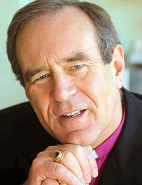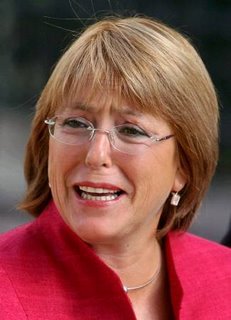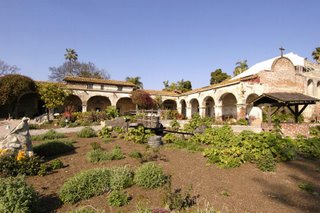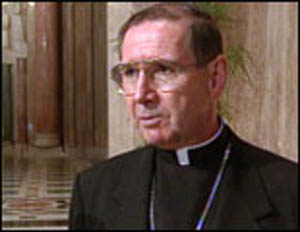Presiding Bishop, deputies' president respond to 'extracanonical' actions
By Mary Frances Schjonberg
Monday, December 04, 2006
[Episcopal News Service] The Episcopal Church's Presiding Bishop and the President of its House of Deputies both said on December 4 they deplore the action taken two days earlier by the Diocese of San Joaquin, effectively repudiating its membership in the Episcopal Church.
Presiding Bishop Katharine Jefferts Schori said in a statement that she "laments" the move and is working with others to respond to "these extracanonical actions."
"Our task as the Episcopal Church is God's mission of reconciling the world, and actions such as this distract and detract from that mission," she said.
Jefferts Schori said in her statement that she also "deeply" laments the "pain, confusion, and suffering visited on loyal members of the Episcopal Church within the Diocese of San Joaquin," and wants them "to know of my prayers and the prayers of many, many others."
House of Deputies President Bonnie Anderson expressed similar concerns.
"I am saddened by the actions of the bishop and the convention in the Diocese of San Joaquin," she said. "In my mind's eye, I can see the faces of the deputies from the diocese and I wonder how they must be feeling. In the diocese there must be a mix of emotions present. Surely the people are not all of one mind."
Anderson -- elected in 2006 to lead the church's clergy and lay deputies representing each of the Episcopal Church's 110 dioceses -- said that those who claim "I have no need of you" bear "a huge burden."
"I pray that Episcopalians in the Diocese of San Joaquin know they are held closely in prayer by me and many of their brothers and sisters across the Episcopal Church," she said.
Meeting during its 47th annual Convention December 1-2, the diocese approved the first reading of four constitutional amendments which would remove references to the Episcopal Church, make the Standing Committee the ecclesiastical authority in the absence of any sitting bishops, put all diocesan trust funds under the control of the bishop, and permit the diocese unilaterally to extend itself beyond its current geographic boundaries.
The constitutional amendments will not take effect until a second vote is taken at another annual convention meeting, scheduled for October 2007. The second reading will require a two-thirds majority in order for the amendments to pass, according to the release.
Jefferts Schori noted in her statement that if the amendments pass their second reading, they effectively violate the requirements of the Episcopal Church's Constitution and Canons. Article V, Section 1 says that a diocese's constitution must include "an unqualified accession" to the constitution and canons of the Episcopal Church.
The convention also passed a resolution directing the bishop, council, and standing committee "to assess the means of our affiliation with a recognized Ecclesiastical structure of the Anglican Communion," and bring the next convention a "detailed plan for the preservation of our relationship with the Anglican Communion."
The only constitutional amendment described in a diocesan news release issued December 2 and posted on the diocese's website was a change to Article II of its constitution. The change would identify the diocese specifically as a "constituent member of the Anglican Communion and in full communion with the See of Canterbury."
In a vote by orders, 68 of the clergy voted in favor of the amendment, while 16 were opposed. The lay delegates voted 108 in favor, with 12 opposed to the amendment to Article II, according to the news release.
The other three proposed amendments passed by similar margins.
"Official observers" were present from dissident congregations in other California dioceses, including St. John's Anglican Church, Fallbrook; St. Anne's Church, Oceanside; St. James' Church, Newport Beach; St. Luke's of the Mountains Anglican Church in La Crescenta; St. Jude's Church, Burbank; and the Western Convocation of the Anglican Communion Network, based in Long Beach. The observers stood applauding when the constitutional amendment expanding the boundaries of the diocese passed.
"This amending process is the first step in the removal from our Constitution of any reference to the Episcopal Church because – in our opinion – they have decided to walk apart from the Anglican Communion," Schofield said in his convention address.
Schofield said that since the 1974 irregular ordinations of 11 women deacons as Episcopal priests, "many voices familiar to you [have] withstood the erosion of faith, the lowering of the standards of morality, and the unilateral action of the Episcopal Church." Schofield is one of only three remaining diocesan bishops who oppose the ordination of women as priests and bishops in the Episcopal Church. He also opposes the 2003 election of a gay bishop in New Hampshire.
But not all agreed with the convention's action. In a written message to the gathering, Maria Rivera, daughter of the late Bishop Victor M. Rivera, third bishop of San Joaquin, told the convention that "wrenching this Diocese from its mother church accomplishes no spiritual goal that cannot be achieved in less violent and more Christian ways."
The Rev. Rick Matters, rector of St. John's Episcopal Church in Lodi, California, said that members of the diocese who disagree with the convention's choices are "optimistic and prayerful and wearied by the spiritual violence, and the spiritual battle we've undertaken."
"We are remaining faithful to Jesus Christ from within the Episcopal expression of the faith," Matters said. "The posturing out here is a false choice: you choose Jesus or you choose the Episcopal Church, you choose scriptural witness or you abandon that and go with the Presiding Bishop and the House of Bishops. We deny that false dichotomy."
The group Remain Episcopal is making plans as well, he said. "We're going to have a plan of how to maintain this diocese – those of us who want to continue in the Episcopal Church," Matters said.
Matters said that in pre-convention meetings Schofield told the diocese's deaneries that in November he signed a "pledge of allegiance" to six Anglican Communion bishops, including Nigerian Primate Peter Akinola and Archbishop Gregory Venables of the Southern Cone (South America), who addressed the convention Eucharist by an internet downlink.
"He is now taking orders from them in terms of how to leave and separate from the Episcopal Church and how to realign," Matters said, adding that Schofield told the meetings that those bishops were setting the timetable for such a move and determining who would be involved.
The convention's actions occurred just after an exchange of letters between Jefferts Schori and Schofield. On November 20, the Presiding Bishop sent Schofield a letter, telling him that if he disagrees with the policy of the church "the more honorable course would be to renounce your orders in this Church and seek a home elsewhere."
She warned in the letter that his public assertion that he must violate his vows "puts many, many people at hazard of profound spiritual violence."
On November 28, Schofield replied that, because she had not issued him an ultimatum but instead offered "further discussion which could possibly lead to some degree of reconciliation," he would not move up the date of the 2007—unless she or anyone else charges him with violating his ordination vows to uphold the doctrine, discipline and worship of the Episcopal Church. Nevertheless, he told Jefferts Schori, he believes "the Episcopal Church, as an institution, is walking a path of apostasy and those faithful to God's Word are forced to make painful choices."
The Diocese of San Joaquin comprises about 10,000 Episcopalians worshipping in 48 congregations
.
-- The Rev. Mary Frances Schjonberg is national correspondent for the Episcopal News Service.















